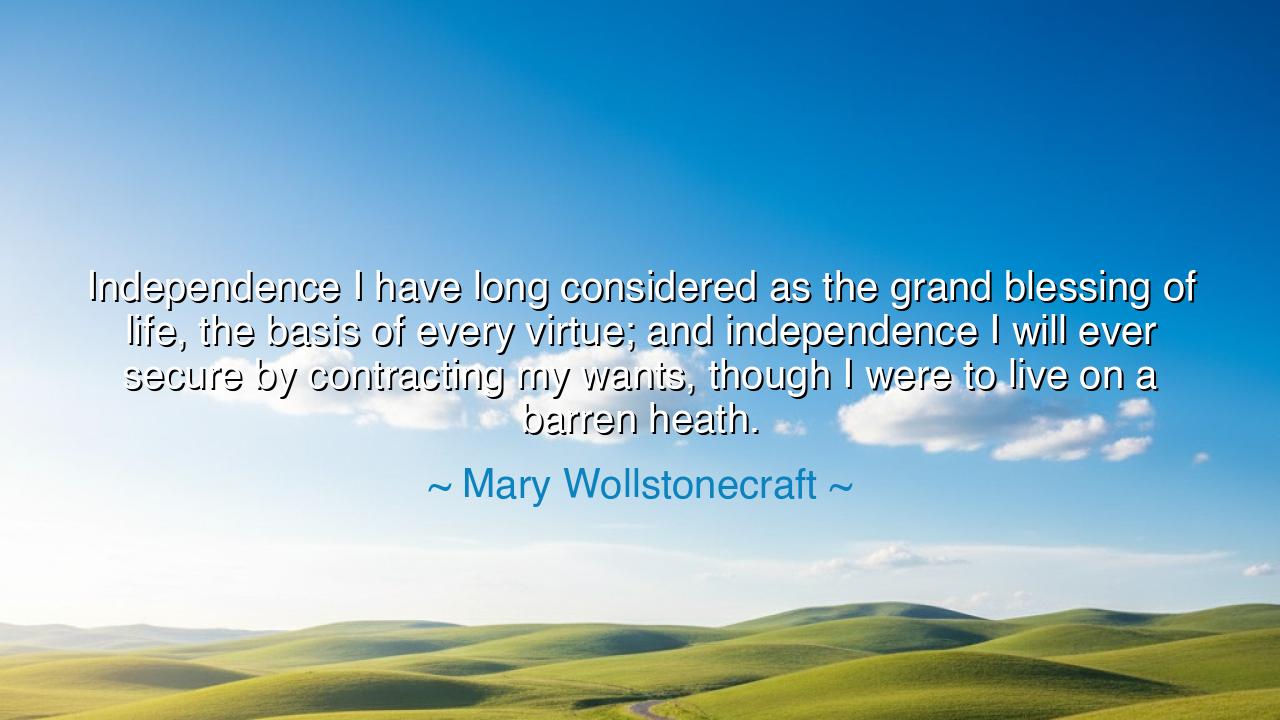
Independence I have long considered as the grand blessing of
Independence I have long considered as the grand blessing of life, the basis of every virtue; and independence I will ever secure by contracting my wants, though I were to live on a barren heath.






Hear now the words of Mary Wollstonecraft, the mother of modern liberty, the fierce spirit who spoke when women were silenced: “Independence I have long considered as the grand blessing of life, the basis of every virtue; and independence I will ever secure by contracting my wants, though I were to live on a barren heath.” These are not words of comfort, but of fire — the declaration of a soul determined to live free, even in hardship. In this single sentence, Wollstonecraft lifts independence from a mere privilege to a sacred principle, the root from which all other virtues spring. She teaches that freedom is not bought with wealth or status, but won through self-mastery — through the discipline to want little and the courage to stand alone.
The origin of this quote lies in Wollstonecraft’s own life, a life lived in rebellion against the narrow boundaries of her age. Born in the eighteenth century, she witnessed a world that denied women education, autonomy, and dignity. Yet she refused to be confined by it. She became a teacher, a writer, a philosopher — and most of all, a voice of conscience in a society ruled by dependence. Her book, A Vindication of the Rights of Woman, became a clarion call for equality, proclaiming that women were not born to be ornaments or dependents, but rational beings deserving of freedom. When she wrote that independence is the grand blessing of life, she spoke from the marrow of her own struggle, declaring that no true virtue can flourish in bondage — whether that bondage be to a man, a system, or one’s own desires.
The ancients, too, would have revered her wisdom. The Stoics of old — Epictetus, once a slave, and Seneca, born into power — both taught that independence is not the absence of need, but the mastery of it. Wollstonecraft echoes their truth: that the soul grows strongest not when it has much, but when it requires little. To “contract one’s wants,” as she wrote, is to build the fortress of the spirit — a sanctuary where the storms of fortune cannot enter. The woman who can live “on a barren heath,” content in her integrity, is freer than the queen who trembles at the loss of her crown. For freedom born from virtue is eternal, while comfort without principle is a gilded cage.
Consider the story of Diogenes, the philosopher of ancient Greece, who cast aside his possessions to live in a barrel. When Alexander the Great came to him and offered any gift he desired, Diogenes replied only, “Stand out of my sunlight.” In that moment, the king of the world stood before a man he could not conquer — one who had found liberty not in riches, but in simplicity. Wollstonecraft’s spirit was akin to his: she, too, believed that the fewer one’s needs, the greater one’s independence. By reducing her wants, she could not be bribed, owned, or subdued. Her wealth was her will. Her home was her conscience.
But her words were not spoken from comfort — they were forged in hardship. Wollstonecraft endured betrayal, poverty, and scorn. She loved deeply and suffered greatly, yet through every wound she held fast to her creed: that dependence was the root of corruption, and independence the seed of virtue. Even when she was cast aside, she refused to barter her integrity for security. She would rather live on “a barren heath” — alone but free — than dwell in luxury purchased by submission. Such is the heroic defiance of her spirit: she measured life not by ease, but by authenticity.
Her teaching is not only for women, nor only for her time. It speaks to all who would live with dignity in any age. In our own world, where comfort seduces and dependence disguises itself as convenience, her words are a clarion warning. To live rightly, she says, one must rule one’s own desires, not be ruled by them. Independence begins not in the body, but in the mind — in the ability to say, “I have enough.” The man or woman who is free from the tyranny of wanting is beyond corruption. For no one can enslave a soul that does not crave what others control.
O listener, take this lesson as a compass for your life: do not measure your freedom by your possessions, but by your peace of mind. Reduce your wants until they can be satisfied by your own hands. Refuse to trade integrity for approval, truth for comfort, or freedom for luxury. Let your needs be simple, your heart be steady, and your conscience be your wealth. In doing so, you will know the grand blessing that Wollstonecraft spoke of — the independence that is the basis of every virtue, the flame that burns eternal within the self-reliant soul.
And so, let her words endure through the centuries: that true independence is not the privilege of the powerful, but the birthright of the wise. To live free is to live within one’s means, to stand upon one’s principles, and to walk unshackled by the chains of excess. Whether in palace or heath, the truly independent spirit needs no master — for it has already mastered itself.






AAdministratorAdministrator
Welcome, honored guests. Please leave a comment, we will respond soon